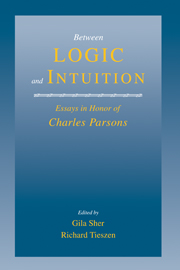Book contents
- Frontmatter
- Contents
- Preface
- I LOGIC
- II INTUITION
- Immediacy and the Birth of Reference in Kant: The Case for Space
- Geometry, Construction and Intuition in Kant and his Successors
- Parsons on Mathematical Intuition and Obviousness
- Gödel and Quine on Meaning and Mathematics
- III NUMBERS, SETS AND CLASSES
- Name Index
Gödel and Quine on Meaning and Mathematics
Published online by Cambridge University Press: 02 December 2009
- Frontmatter
- Contents
- Preface
- I LOGIC
- II INTUITION
- Immediacy and the Birth of Reference in Kant: The Case for Space
- Geometry, Construction and Intuition in Kant and his Successors
- Parsons on Mathematical Intuition and Obviousness
- Gödel and Quine on Meaning and Mathematics
- III NUMBERS, SETS AND CLASSES
- Name Index
Summary
Charles Parsons (1995b, p. 309) has noted that Gödel never discussed the deeper issues about meaning that are addressed by Quine. Parsons says that the only place where Gödel even begins to approach these issues is in a paper entitled “The Modern Development of the Foundations of Mathematics in the Light of Philosophy” (Gödel*1961/?). In this paper, Gödel argues that a foundational view is needed that would allow us to cultivate and deepen our knowledge of the abstract concepts that underlie formal or “mechanical” systems of mathematics. It should be a viewpoint that is favorable to the idea of clarifying and making precise our understanding of these concepts and the relations that hold among them. Gödel says that phenomenology offers such a method for clarification of the meaning of basic mathematical concepts. The method does not consist in giving explicit definitions but consists instead “in focusing more sharply on the concepts concerned by directing our attention in a certain way, namely, onto our own acts in the use of those concepts, onto our powers in carrying out our acts, etc.” It is through such a methodological view that we might hope to facilitate the development of mathematics and to gain insights into the solvability of meaningful mathematical problems.
The current philosophical climate is certainly not favorable to this idea. Gödel wrote a number of other papers (e.g., *1951, *1953/1959-III and - V, 1947/1964, 1972a) in which, in effect, he criticized views of mathematics that were not favorable to it.
- Type
- Chapter
- Information
- Between Logic and IntuitionEssays in Honor of Charles Parsons, pp. 232 - 254Publisher: Cambridge University PressPrint publication year: 2000
- 1
- Cited by



